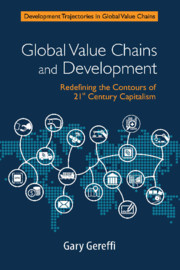Book contents
- Frontmatter
- Dedication
- Contents
- List of Tables
- List of Figures and Boxes
- Foreword
- Acknowledgments
- Sources
- 1 The Emergence of Global Value Chains: Ideas, Institutions, and Research Communities
- Part I Foundations of the Global Value Chain Framework
- Part II Expanding the Governance and Upgrading Dimensions in Global Value Chains
- 5 The Global Economy: Organization, Governance, and Development
- 6 Local Clusters in Global Chains: The Causes and Consequences of Export Dynamism in Torreon's Blue Jeans Industry
- 7 Development Models and Industrial Upgrading in China and Mexico
- 8 Economic and Social Upgrading in Global Production Networks: A New Paradigm for a Changing World
- 9 Regulation and Economic Globalization: Prospects and Limits of Private Governance
- 10 Economic and Social Upgrading in Global Value Chains and Industrial Clusters: Why Governance Matters
- Part III Policy Issues and Challenges
- Co-authors
- Index
9 - Regulation and Economic Globalization: Prospects and Limits of Private Governance
from Part II - Expanding the Governance and Upgrading Dimensions in Global Value Chains
Published online by Cambridge University Press: 09 November 2018
- Frontmatter
- Dedication
- Contents
- List of Tables
- List of Figures and Boxes
- Foreword
- Acknowledgments
- Sources
- 1 The Emergence of Global Value Chains: Ideas, Institutions, and Research Communities
- Part I Foundations of the Global Value Chain Framework
- Part II Expanding the Governance and Upgrading Dimensions in Global Value Chains
- 5 The Global Economy: Organization, Governance, and Development
- 6 Local Clusters in Global Chains: The Causes and Consequences of Export Dynamism in Torreon's Blue Jeans Industry
- 7 Development Models and Industrial Upgrading in China and Mexico
- 8 Economic and Social Upgrading in Global Production Networks: A New Paradigm for a Changing World
- 9 Regulation and Economic Globalization: Prospects and Limits of Private Governance
- 10 Economic and Social Upgrading in Global Value Chains and Industrial Clusters: Why Governance Matters
- Part III Policy Issues and Challenges
- Co-authors
- Index
Summary
Introduction
The last two decades have witnessed a remarkable burst of innovation in ‘private governance’, i.e., non-governmental institutions that ‘govern—that is they enable and constrain—a broad range of economic activities in the world economy’. These institutions serve functions that have historically been the task of governments, most notably that of regulating the negative externalities of economic activity. Private governance takes many forms: standards governing a vast array of environmental, labor, health, product safety, and other matters; codes of conduct promulgated by corporations, industry associations, and non-governmental organizations (NGOs); labels that rely on consumer demand for ‘green’ and ‘fair trade’ products; and even self-regulation by corporations under the banner of corporate social responsibility (CSR).
The move towards private governance is best seen as a response to societal pressures spawned by economic globalization and by the inadequacy of public governance institutions in addressing them. As firms, production networks, and markets transcended national boundaries, public (governmental) systems of economic governance built on the unit of the nation-state proved inadequate for regulating an increasingly fragmented and footloose global economy. In the language of Polanyi, markets became ‘dis-embedded’ from societal and state institutions (Polanyi, 1944. See also Evans, 1985; Ruggie, 1982). Logically, economic globalization demands global regulation, but at the international level regulatory standards are generally weak and there is little capacity to enforce them. In the developing world, where production is increasingly concentrated, many states lack the capacities of law, monitoring, and enforcement needed to regulate industry, even when they have strongly worded legislation on the books. The failure of public governance institutions to keep pace with economic globalization has, therefore, created a global ‘governance deficit’.
As Polanyi would predict, workers, environmentalists, human rights activists, and others in civil society have mobilized to demand new forms of governance. Part of this response focused on attempting to alter public policies—i.e., pushing back against neoliberal economic prescriptions or demanding that market opening be accompanied by regulatory measures. Frustrated with the perceived inability of governmental institutions to respond to the governance challenge, however, many social activists and labor groups also turned to pressure campaigns targeted at corporations and to other strategies designed to use market pressure to regulate the behavior of producers.
- Type
- Chapter
- Information
- Global Value Chains and DevelopmentRedefining the Contours of 21st Century Capitalism, pp. 253 - 275Publisher: Cambridge University PressPrint publication year: 2018
- 1
- Cited by

